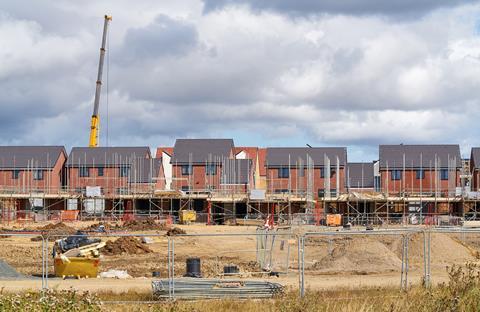
Catherine Kennedy, head of development and head of housing and regeneration (property) at Forbes Solicitors looks at what 2022 holds for the housing sector
After showing a great deal of resilience and recovery during 2020 and 2021, it’s reasonable to expect ‘risk’ to shape a number of key housing sector trends next year.

Risk management will take centre stage as the market aims to build on this year’s boom and mitigate any post-peak declines. Further reasons that risk will prove so influential to housing trends are because of diversification and reinvention in the market, and the growing importance of quality standards and governance.
Reinvention
Looking beyond spiking house prices, the pandemic has changed how people live and work. Hybrid working is fast becoming the norm, which is causing planners, developers and landlords to rethink urban spaces.
Developments are increasingly becoming mixed use, bringing together living, leisure and work, and blurring the lines between residential and commercial property expertise. This will drive a growing trend of joint ventures, that comprise a mix of private and public sector organisations. While this will present new opportunities for the housing sector, it will also create new complexities and risks that will require thorough due diligence to keep projects on time and budget. Partnership agreements and frameworks will need to be properly structured to ensure clear lines of responsibility and accountability.
Diversification
Recent months saw Lloyds Banking Group move into the buy-to-let market. This could lead to it becoming Britain’s largest private landlord and has the potential to accelerate the build-to-rent trend.
Large, well-financed corporates investing in buy-to-let homes could see a further shift in homeownership in 2022 and changes in rental models. Heightened competition could drive down rental prices, while driving up service standards for tenants. Build-to-rent markets are often associated with no hidden costs, added value services and generally higher-quality service delivery. This is likely to prove food for thought for traditional housebuilders, especially as first-time buyers struggle to afford to get on the property ladder. Considered risk management will be required to adjust to a market where tenants expect more flexible terms and conditions, and demand more from landlords than general maintenance.
Quality standards
The Department for Levelling Up, Housing and Communities plans to publish the government’s white paper on reforms to the private rented sector (PRS) in 2022.
An exact date is still to be confirmed; however, it’s likely that the PRS white paper will echo many of the housing policies and reforms that we’ve seen throughout various parts of the sector during the past couple of years. The social housing white paper (November 2020) is heavily focused on giving residents a voice, while the Housing Ombudsman Complaints Handling Code (July 2020) is designed to better address tenant concerns.

“Levelling up” is high on the government’s agenda, and this largely involves improving housing standards by better respecting residents. The social housing white paper will remain prominent next year as proposals are legislated, and the PRS white paper will bring similar reforms that empower tenants to improve the standards of properties and maintenance.
Landlords throughout the private and public sectors will need to ensure they are proactively managing and evidencing risk throughout their organisations to put residents first. This will involve a growing focus on documenting resident concerns and showing timely resolutions that achieve satisfaction among renters.
Governance
One of the biggest indications of the growing importance of governance for the housing sector can be seen at Homes England. The government’s housing agency has identified areas for improvements and accepted there were “significant weaknesses” in terms of governance and risk management.
The agency is now focusing on improving its control environment, which involves the transition from old and ineffective systems. This covers areas such as more effective data and decision-making processes, as well as effective use of organisational capacity and resource. It’s a timely reminder for housing providers of any scale that governance is taken seriously at the very top and that, when it comes to risk management, the government is aiming for leading by example.

There will, undoubtedly, be many more opportunities and challenges facing housing next year. The sector is evolving at pace, with a rate of change accelerated by the impacts of the pandemic, and it’s difficult to wholly predict what will happen next. One certainty, though, is that risk management will become increasingly complex – and possibly more fragmented – as the sector continues to adapt.
Forbes Solicitors’ 70 strong Housing Group is well prepared for this, offering clients a rich mix of housing an regeneration sector experience, the full range of property and litigation services, along with procurement, governance, information and employment law. It ensures we can provide seamless advice and timely solutions to help housing sector clients keep ahead in a fast-moving market in 2022 and beyond.

About Forbes Solicitors:
Forbes Solicitors is an award-winning law firm, with 11 offices across England that looks after the interests of clients nationwide.
The firm has more than 40 partners and an overall headcount of nearly 400, advising on a wide range of commercial and personal matters. Forbes specialises in supporting SMEs, providing legal expertise in practice areas including litigation, commercial, corporate legal services, employment, insurance, commercial property and individual services.
Forbes holds the ISO9001 Quality Certification and in its recent assessment it was described as “exceptional”. The firm is ranked as a Legal 500 Top Tier Firm and a Chambers and Partners Leading Firm, receiving 70 nominations in the latest editions. Furthermore, a number of its partners are included in the elite “Leading Individuals” list, the “Next Generation Lawyers” list, and 41 of Forbes’ solicitors are listed as recommended lawyers. Forbes is also a member of LawPact® - the international association of independent business law firms – which supports the expansion of its national and global reach.
Downloads
Forbes - Housing Today SC FINAL
Word, Size 17.74 kb









